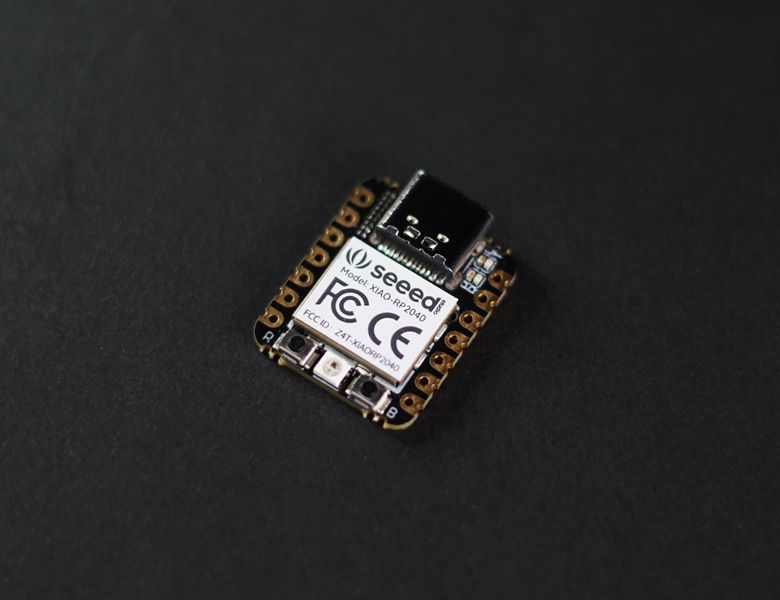
Seeed Studio XIAO RP2040 by Seeed Studio
Seeed Studio XIAO RP2040 is a microcontroller using the Raspberry RP2040 chip. It runs at up to 133 MHz, is built with rich interfaces in a tiny thumb size, and fully supports Arduino, MicroPython, and CircuitPython.
The XIAO RP2040 is a development board of the Seeed Studio XIAO series. Like the Seeed Studio XIAO SAMD21, it is a compact board with a wide range of interfaces. The XIAO RP2040 is equipped with the Raspberry RP2040 chip (Dual-core ARM® Cortex® M0+) and has 2 MB of Flash on board.
Interfaces:
- 11 digital pins
- 4 analog pins
- 11 PWM Pins
- 1 I2C interface
- 1 UART interface
- 1 SPI interface
- 1 SWD Bonding pad interface
Some PINs have various functions, Moreover, XIAO RP2040 supports the USB-C interface which can supply power and download code. 1 Reset button, 1 BOOT button, 1 user-programmable RGB LED, 1 power LED, 2 status indicators, and 1 user LED are on board, allowing developers to debug their code very easily.
The XIAO RP2040 is very compact because all electronic components are soldered on the same board surface, which means you can easily solder the XIAO RP2040 to your own PCB. XIAO RP2040 is pin-compatible with Seeed Studio XIAO SAMD21, so XIAO RP2040 can be learned and developed using the Expansion board of Seeeduino XIAO.
Tutorial
Purchase
Contribute
Have some info to add for this board? Edit the source for this page here.
CircuitPython 9.2.8
This is the latest stable release of CircuitPython that will work with the Seeed Studio XIAO RP2040. Use this release if you are new to CircuitPython.
Modules included in this download
_asyncio _bleio _pixelmap adafruit_bus_device adafruit_pixelbuf aesio alarm analogbufio analogio array atexit audiobusio audiocore audiomixer audiomp3 audiopwmio binascii bitbangio bitmapfilter bitmaptools bitops board builtins builtins.pow3 busdisplay busio busio.SPI busio.UART codeop collections countio digitalio displayio epaperdisplay errno floppyio fontio fourwire framebufferio getpass gifio hashlib i2cdisplaybus i2ctarget imagecapture io jpegio json keypad keypad.KeyMatrix keypad.Keys keypad.ShiftRegisterKeys keypad_demux keypad_demux.DemuxKeyMatrix locale math memorymap microcontroller msgpack neopixel_write nvm onewireio os os.getenv paralleldisplaybus pulseio pwmio qrio rainbowio random re rgbmatrix rotaryio rp2pio rtc sdcardio select sharpdisplay storage struct supervisor synthio sys terminalio tilepalettemapper time touchio traceback ulab usb usb_cdc usb_hid usb_host usb_midi usb_video vectorio warnings watchdog zlibFeatures: Breadboard-Friendly, Xiao / QTPy Form Factor, USB-C, Castellated Pads
CircuitPython 10.0.0-alpha.8
This is the latest development release of CircuitPython that will work with the Seeed Studio XIAO RP2040.
Alpha development releases are early releases. They are unfinished, are likely to have bugs, and the features they provide may change. Beta releases may have some bugs and unfinished features, but should be suitable for many uses. A Release Candidate (rc) release is considered done and will become the next stable release, assuming no further issues are found.
Please try alpha, beta, and rc releases if you are able. Your testing is invaluable: it helps us uncover and find issues quickly.
Release Notes for 10.0.0-alpha.8
Modules included in this download
_asyncio _bleio _bleio (HCI co-processor) _pixelmap adafruit_bus_device adafruit_pixelbuf aesio alarm analogbufio analogio array atexit audiobusio audiocore audiomixer audiomp3 audiopwmio binascii bitbangio bitmapfilter bitmaptools bitops board builtins builtins.pow3 busdisplay busio busio.SPI busio.UART codeop collections countio digitalio displayio epaperdisplay errno floppyio fontio fourwire framebufferio getpass gifio hashlib i2cdisplaybus i2ctarget imagecapture io jpegio json keypad keypad.KeyMatrix keypad.Keys keypad.ShiftRegisterKeys keypad_demux keypad_demux.DemuxKeyMatrix locale lvfontio math memorymap microcontroller msgpack neopixel_write nvm onewireio os os.getenv paralleldisplaybus pulseio pwmio qrio rainbowio random re rgbmatrix rotaryio rp2pio rtc sdcardio select sharpdisplay storage struct supervisor synthio sys terminalio tilepalettemapper time touchio traceback ulab usb usb_cdc usb_hid usb_host usb_midi usb_video vectorio warnings watchdog zlibFeatures: Breadboard-Friendly, Xiao / QTPy Form Factor, USB-C, Castellated Pads
Absolute Newest
Every time we commit new code to CircuitPython we automatically build binaries for each board and language. The binaries are stored on Amazon S3, organized by board, and then by language. These releases are even newer than the development release listed above. Try them if you want the absolute latest and are feeling daring or want to see if a problem has been fixed.
Previous Versions of CircuitPython
All previous releases of CircuitPython are available for download from Amazon S3 through the button below. For very old releases, look in the OLD/ folder for each board. Release notes for each release are available at GitHub button below.
Older releases are useful for testing if you something appears to be broken in a newer release but used to work, or if you have older code that depends on features only available in an older release. Otherwise we recommend using the latest stable release.
